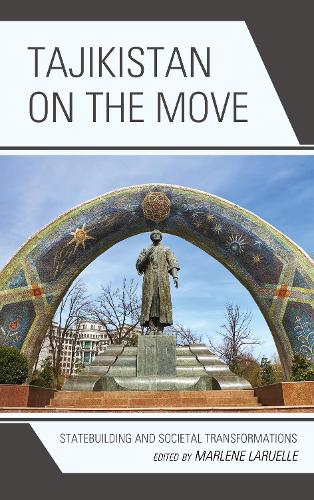
Tajikistan on the Move: Statebuilding and Societal Transformations
(Hardback)
Publishing Details
Tajikistan on the Move: Statebuilding and Societal Transformations
By (Author) Marlene Laruelle
Contributions by Hafiz Boboyorov
Contributions by Jesse Driscoll
Contributions by Michele Commercio
Contributions by Tim Epkenhans
Contributions by John Heathershaw
Contributions by Brent Hierman
Contributions by Sophie Hohmann
Contributions by Marlene Laruelle
Contributions by Edward Lemon
Bloomsbury Publishing PLC
Lexington Books
25th May 2018
United States
Classifications
Professional and Scholarly
Non Fiction
958.6086
Physical Properties
Hardback
336
Width 160mm, Height 229mm, Spine 26mm
717g
Description
The southernmost and poorest state of the Eurasian space, Tajikistan collapsed immediately upon the fall of the Soviet Union and plunged into a bloody five-year civil war (19921997) that left more than 50,000 people dead and more than half a million displaced. After the 1997 Peace Agreements, Tajikistan stood out for being the only post-Soviet country to recognize an Islamic partythe Islamic Renaissance Party of Tajikistan (IRPT)as a key actor in the civil war as well as in postwar reconstruction and democratization. Tajikistans linguistic and cultural proximity to Iran notwithstanding, the balance of external powers over the country remains fairly typical of Central Asia, with Russia as the major security provider and China as its principal investor. Another specificity of Tajikistan is its massive labor migration flows toward Russia. Out of a population of eight million, about one million work abroad seasonallyone of the highest rates of departure in the world. Migration trends have impacted Tajikistans economy and rent mechanisms: half of the countrys GDP comes from migrant remittances, a higher share than anywhere else in the world. However, it is in the societal and cultural realms that migration has had the most transformative effect. Migrants cultural and societal identities are on the move, with a growing role given to Islam as a normative tool for regulating the cultural shock of migration. Islam, and especially a globalized fundamentalist pietist movement, regulates both physical and moral security in workplace and other settings, and brings migrants together to make their interactions meaningful and socio-politically relevant. It offers a new social prestige to those who work in an environment seen as threatening to their Islamic identity. The first section of this volume investigates the critical question of the nature of the Tajik political regime, its stability, legitimacy mechanisms, and patterns of centralization. In the volumes second part, we move away from studying the state to delve into the societal fabric of Tajikistan, shaped by local rural specificities and social vulnerabilities in the health sector and gender relationships. The third section of the volume is devoted to identity narratives and changes. While the Tajik regime works hard to control the national narrative and the interpretation of the civil war, society is literally and figuratively on the move, as migration profoundly reshapes societal structures and cultural values.
Reviews
This collection of studies on state and society and their interplay combines the best of theoretically informed and ethnographically grounded research to date on contemporary Tajikistan. The authors collectively offer nuanced and realistic assessments of the political, economic, and social dynamics influencing Tajikistans autocratic regime, the elites within, on the margins of, and excluded from the ruling Rahmon familys consolidated privileges, and the broader Tajik population at home and abroad. In short, this is a sobering and useful resource for scholars, policymakers, and program implementers seeking a deep understanding of this so-called post post-conflict country. -- David Abramson, Georgetown University
This is an important study. Compiling a wide range of topics such as foreign policy, civil war memories, migration, gender relations, and Muslim piety, it provides an impressive kaleidoscopic image of post-civil war Tajikistan. Casting new light on the state-society nexus, this volume is a remarkable advance in our understanding of the multiple movements in and beyond the country on local, translocal, and regional scales. This is a significant book not only for scholars of Tajikistan and Central Asia but also for scholars of political science, anthropology, and area studies interested in the complex assemblage of authoritarian state politics, socio-economic complexities, and mobility at the crossroad of postsocialism and globalization. -- Manja Stephan-Emmrich, Humboldt University of Berlin
This is an excellent book that brings together insights from cutting-edge research on Tajikistan, greatly advancing our understanding of the country. The contributors deftly integrate social science theories and concepts into their fine-grained analysis, covering a number of key issues confronting the country: how the state pursues security at home and abroad; what underlying support sustains its authoritarian rule; how society addresses daunting challenges such as inequality, drug use, polygyny, and migration; and what are the underlying legacies of its civil war. This book, in short, provides a penetrating look into the most essential problems in Tajikistans politics and society. -- Lawrence P. Markowitz, Rowan University
Author Bio
Marlene Laruelle is research professor, director of the Central Asia Program, and associate director of the Institute for European, Russian, and Eurasian Studies (IERES) at the Elliott School of International Affairs of George Washington University.
